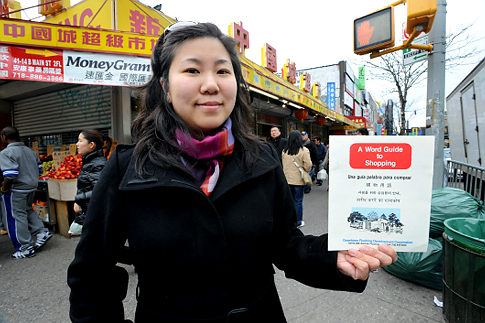
Assemblywoman Grace Meng was endorsed by the Queens Democratic Party for the Sixth Congressional District earlier this week. An endorsement by the party, however, does not guarantee victory. Meng has drawn two opponents in the Democratic primary, which will be held on June 26. Her competitors are Assemblyman Rory Lancman and City Councilwoman Liz Crowley.
At first glance, it appears that Meng has an easy path to victory. Last week, the federal courts re-drew New York’s Congressional Districts and drew the Sixth to include approximately 40% APAs. The district was drawn ostensibly encourage an APA American candidate to run or, at the very least, force any potential candidate to address issues facing the APA American community. Since there are so many APAs in the district, it appears that Meng is a lock for the primary.
But upon closer inspection, that may not be the case. Although APAs make up 40% of the district, they make up only 32% of the voting-age population. It’s also likely that a larger proportion (when compared to Caucasian voters in the district) of this 32% include either non-citizens or those who are not registered to vote. Even worse, according to the New York Observer, “likely” APA voters in a Congressional primary make up just 27% of all likely primary voters.
In fact, a sizeable proportion of likely voters in the Democratic primary are Jewish. Not only is Meng’s opponent Assemblymember Lancman a staunch proponent of Israel, he is himself Jewish. The Jewish American voting bloc in New York has, in the past, proved itself to be tremendously influential at the voting booth. They will undoubtedly be out in full force on the June 26th primary.
Meng does have unique strengths, though. Her historic candidacy will undoubtedly galvanize the New York APA community and will allow her to raise extraordinarily large amounts of money in a short amount of time. Congressional races are notoriously expensive, so Meng’s fundraising prowess will be a huge advantage over (at the very least) Councilwoman Liz Crowley, who is not a known fundraising powerhouse. Lancman is a more formidable fundraising opponent though, because over the last few months he’s already raised $120,000 in anticipation for a potential run for Congress.
Victory in the primary depends on who will be best able to bring their supporters to the polls. To that end, Meng should concentrate her efforts on driving out the APA vote—by registering new Democratic voters and by using her campaign to physically bring voters to the polls (GOTV) on primary day. Meng should also tap into the wide network of APA political donors not only in the New York City area but countrywide.
But she should take care to avoid staking her campaign on ethnic appeal; that is, she should avoid the message of “vote for me because I’m a historic APA candidate.” That approach runs the risk of alienating potential primary voters who don’t care about electing APA candidates.
With regards to political positions, Meng would be well served by taking up pro-Israel positions in order to blunt the advantage Lancman has in the Jewish American community. If she comes across as anything less, she runs the risk of following the example of David Weprin, who despite being Jewish, lost the Jewish American vote in a special Congressional election last year. Meng should also be vocal about immigration reform (such as supporting the Dream Act) because 18% of the district is Hispanic.
Meng has a clear path to victory and may in fact become the first APA American member of Congress from New York. The path is nowhere near guaranteed, however, and Meng should take care to avoid any missteps along the way. New York’s APA community is rooting for her.







